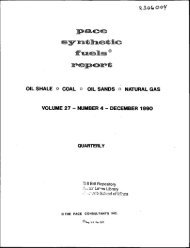Ikelic - Alliance Digital Repository
Ikelic - Alliance Digital Repository
Ikelic - Alliance Digital Repository
You also want an ePaper? Increase the reach of your titles
YUMPU automatically turns print PDFs into web optimized ePapers that Google loves.
STATUS OF COAL PROJECTS (Underline denotes changes since June 1994)<br />
COMMERCIAL AND R&D PROJECTS (Continued)<br />
LAPORTE ALTERNATIVE FUELS DEVELOPMENT PROGRAM -<br />
stitute, and United States Department of Energy (DOE) (C-330)<br />
Air<br />
Products & Chemicals. Inc., Electric Power Research In<br />
Air Products and Chemicals, Inc. is proposing a 36-month program to develop technologies for the conversion of coal-derived syn<br />
thesis gas to oxygenated hydrocarbon fuels, fuel intermediates, and octane enhancers, and to demonstrate the most promising tech<br />
nologies in DOE's Slurry Phase Alternative Fuels Development Unit (AFDU) at LaPorte, Texas. With emphasis on slurry phase<br />
processing, the program will initially draw on the experiences of the successful Liquid Phase Methanol program. (LPMEOH) See<br />
completed project "LaPorte Liquid Phase Methanol Synthesis"<br />
in December 1991 Synthetic Fuels Report for details on the<br />
LPMEOH project.<br />
In the spring of 1992, methanol produced using the LaPorte Liquid Phase Methanol Synthesis Process out performed commercial<br />
chemical-grade methanol in diesel engine runs. In a standard 100 hour test, 2300 gallons of raw methanol from the LaPorte Plant<br />
were run through a typical bus cycle simulation.<br />
The alternative fuels development program aims to continue the investigations initiated in the above research program, with the<br />
principal objective being demonstration of attractive fuel technologies in the LaPorte AFDU. The focus is continued in pilot plant<br />
operations after a 12-18 month period of plant modifications. Certain process concepts such as steam injection, and providing H<br />
via in situ water-gas shift, will assist in higher conversions of feedstocks which are necessary, particularly for higher alcohol syn<br />
thesis.<br />
Four operating campaigns are currently envisaged. The first will focus on increased syngas conversion to methanol using steam in<br />
jection and staged operation. The second will demonstrate production of dimethyl ether/methanol mixtures to (1) give optimum<br />
syngas conversion to storable liquid fuels, (2) produce mixtures for both stationary and mobile fuel applications, and (3) produce<br />
the maximum amount of DME, which would then be stored as a fuel intermediate for further processing to higher molecular-<br />
weight oxygenates. Economic, process, and market analyses will provide guidance as to which of these scenarios should be em<br />
phasized. The third and fourth campaigns will address higher alcohols or mixed ether production.<br />
In the laboratory, the principal effort will be developing oxygenated fuel technologies from slurry-phase processing of coal-derived<br />
syngas using two approaches, (1) fuels from syngas directly, and (2) fuels from DME/methanol mixtures. In fiscal year 1993, Air<br />
Products will demonstrate, at DOE's LaPorte Alternative Fuels Development Unit, the synthesis of methanol/isobutanol mixtures,<br />
which can be subsequently converted to MTBE. Preliminary economic analyses have indicated that isobutanol and MTBE from<br />
coal could be cost competitive with conventional sources by the mid- to late-1990s.<br />
Air Products has already demonstrated the unique ability of DME to act as a chemical building-block to higher molecular-weight<br />
oxygenated hydrocarbons. Air Products has also successfully developed and demonstrated a one-step process for synthesizing<br />
dimethyl ether (DME) from coal-derived synthesis gas. In this process, the reactions are carried out in a three-phase system with<br />
the catalyst suspended in an inert liquid medium. The liquid absorbs the heat that is released as the chemical reactions occur, al<br />
lowing the reactions to take place at higher, more efficient rates and protecting the heat-sensitive catalysts necessary for the con<br />
version process. This results in a 30 to 40 percent increase in the rate of methanol production.<br />
Project Cost: $20.5 million FY91-FY93<br />
- LIQUID PHASE METHANOL PROCESS DEMONSTRATION Air<br />
U.S. Department of Energy (C-335)<br />
Products and Chemicals, Inc., Eastman Chemical Company, and<br />
Air Products and Chemicals, Inc. and Eastman Chemical Co. plan to demonstrate the production of liquid phase methanol<br />
Round 3 award. The liquid phase methanol synthesis<br />
(LPMEOH) under a U.S. Department of Energy Clean Coal Technology<br />
process is more efficient than the conventional gas phase process and is better suited for processing the gases produced by modern<br />
coal gasifiers. Producing methanol as a coproduct in combined cycle coal gasification facilities has distinct advantages. The gasifier<br />
can be run continuously at its most efficient level. During periods of low power demand, synthesis gas made by the gasifier would<br />
be converted to methanol for storage. At peak power demand, this methanol could be used to supplement the combustion turbine,<br />
thus lowering the size of the gasifier that would be required if the gasifier alone had to meet peak electrical demand.<br />
The project was originally slated for location at the Texaco Cool Water plant in Dagget, California, but was moved to Eastman<br />
Chemical Company's coal gasification facility in Kingsport, Tennessee. The Eastman Chemical site offers the advantage of the use<br />
of existing coal gasifiers with little modification. The unit will produce at least 200 tons of methanol per day at the Kingsport loca<br />
tion.<br />
Project Cost: $213.7 million; $92 million provided by U.S. Department of Energy<br />
LUBECK IGCC DEMONSTRATION PLANT- PreussenElektra (C-339)<br />
The project of PreussenElektra/Germany has a capacity of 320 MWe net based on hard coal and a net efficiency of 45 percent.<br />
PRENFLO gasification technology has been chosen for the gasifier.<br />
4-64<br />
SYNTHETIC FUELS REPORT, JANUARY 1995



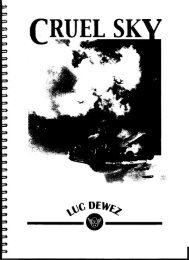
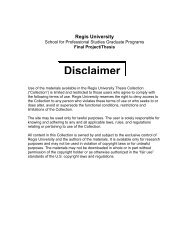
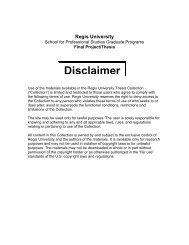

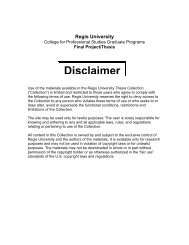

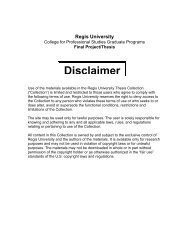
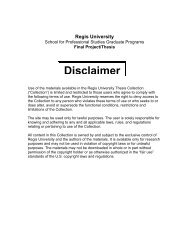
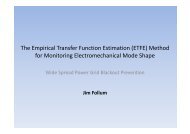
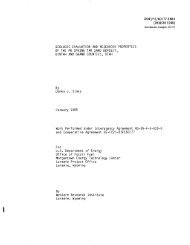

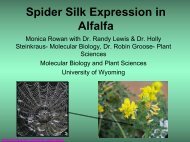
![pace SrntfletIc fne]its report - Alliance Digital Repository](https://img.yumpu.com/10493335/1/190x245/pace-srntfletic-fneits-report-alliance-digital-repository.jpg?quality=85)
